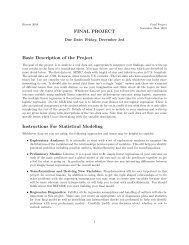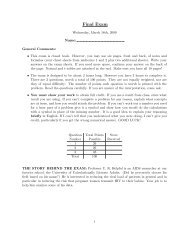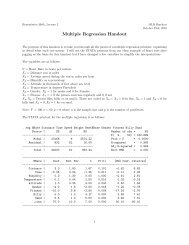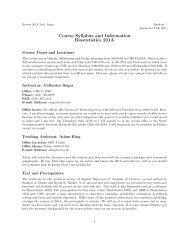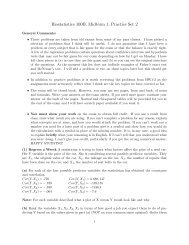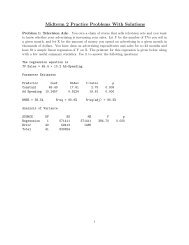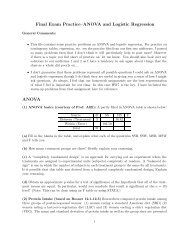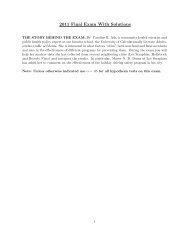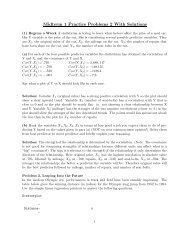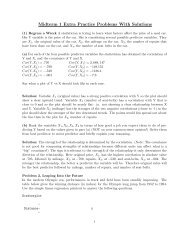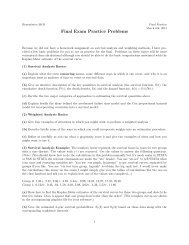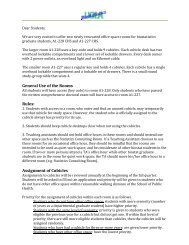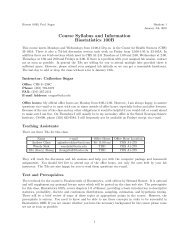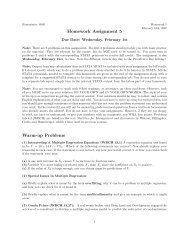Orientation Handbook - UCLA Biostatistics
Orientation Handbook - UCLA Biostatistics
Orientation Handbook - UCLA Biostatistics
- No tags were found...
You also want an ePaper? Increase the reach of your titles
YUMPU automatically turns print PDFs into web optimized ePapers that Google loves.
CONTENTSINTRODUCTION AND MISSION............................................................................................................................... 1SCOPE AND OBJECTIVES ......................................................................................................................................... 1OPPORTUNITIES IN BIOSTATISTICS ........................................................................................................................ 1GRADUATE DEGREES OFFERED .............................................................................................................................. 2DEPARTMENT INFORMATION ................................................................................................................................ 3THE BIOSTATISTICS FACULTY ................................................................................................................................. 4FIELDING SCHOOL OF PUBLIC HEALTH TELEPHONE & ROOM NUMBERS ................................................................ 9DEGREE REQUIREMENTS ........................................................................................................................................ 9MASTER OF SCIENCE IN BIOSTATISTICS (M.S.).................................................................................................................... 10DOCTOR OF PHILOSOPHY IN BIOSTATISTICS (PH.D.) ............................................................................................................ 12MASTER OF PUBLIC HEALTH WITH SPECIALIZATION IS BIOSTATISTICS (M.P.H.) ......................................................................... 14DOCTOR OF PUBLIC HEALTH WITH SPECIALIZATION IN BIOSTATISTICS (DR.P.H.) ....................................................................... 162012-2013 BIOSTATISTICS CLASS SCHEDULE ........................................................................................................ 18<strong>UCLA</strong> CALENDAR .................................................................................................................................................. 20STUDENT AFFAIRS ............................................................................................................................................................ 21<strong>Biostatistics</strong> Student Affairs Office ....................................................................................................................... 21Fielding School of Public Health Student Affairs Office ........................................................................................ 21Course Schedule and Classrooms ........................................................................................................................ 21University Records System Access (URSA) .......................................................................................................... 21Registration ......................................................................................................................................................... 21Paying Fees/Non-Resident Tuition ..................................................................................................................... 21eBill ...................................................................................................................................................................... 22Enrolling in Classes .............................................................................................................................................. 22URSA Enrollment ................................................................................................................................................. 22ENROLLMENT DEADLINES ............................................................................................................................................... 22OFFICIAL DOCUMENTS FROM THE UNIVERSITY .................................................................................................................... 23Datasheet ............................................................................................................................................................ 23BLUE PETITIONS ............................................................................................................................................................ 23ADVISING .................................................................................................................................................................... 23ADVANCEMENT TO CANDIDACY ....................................................................................................................................... 23Master’s Degree .................................................................................................................................................. 23Doctoral Degree ................................................................................................................................................... 24WRITTEN EXAMINATIONS ............................................................................................................................................... 24COURSE WAIVERS ......................................................................................................................................................... 24GRADING .................................................................................................................................................................... 25STANDARDS AND PROCEDURES FOR GRADUATE STUDY AT <strong>UCLA</strong> ........................................................................................... 25STUDY LIST .................................................................................................................................................................. 25TRANSCRIPTS ............................................................................................................................................................... 26GRADUATE STUDENT LIFE AND RESOURCES ........................................................................................................ 26STUDENT HEALTH SERVICES ........................................................................................................................................... 27Arthur Ashe Student Health and Wellness Center ............................................................................................. 27Medical Insurance Requirement / Waiving SHIP ............................................................................................... 27The Counseling Center – Counseling & Psychological Services .......................................................................... 27<strong>UCLA</strong> WRITING PROGRAMS .......................................................................................................................................... 28CAREER DEVELOPMENT ................................................................................................................................................. 28COMPUTER AND TECHNICAL SERVICES ............................................................................................................................. 28ENGLISH AS A SECOND LANGUAGE ................................................................................................................................... 28CALIFORNIA RESIDENCY ................................................................................................................................................. 29COMPUTER FACILITIES/ACCESS........................................................................................................................................ 29BRUIN ONLINE (BOL) ................................................................................................................................................... 29
BRUIN CARD ................................................................................................................................................................ 30STUDENT MAIL/ANNOUNCEMENTS ................................................................................................................................. 30Borrowing a CLICC Laptop ....................................................................................................................................... 30OFFICE FOR STUDENTS WITH DISABILITIES (OSD) .............................................................................................................. 31PARKING, TRANSPORTATION & SHUTTLE SERVICES ............................................................................................................ 32Public Transportation.......................................................................................................................................... 32Parking ................................................................................................................................................................ 32Campus Shuttles .................................................................................................................................................. 32Campus Express ................................................................................................................................................... 32EMPLOYMENT & FINANCIAL AID ...................................................................................................................................... 33Employment ......................................................................................................................................................... 33Special Opportunities ........................................................................................................................................... 33Work study and other need based support .......................................................................................................... 33LOCKERS ..................................................................................................................................................................... 33
Introduction and MissionWelcome to the <strong>Biostatistics</strong> Department at <strong>UCLA</strong>. The <strong>UCLA</strong> Division of <strong>Biostatistics</strong> was established in thebeginning of 1959 in the then new School of Public Health. Among other degree programs, the divisionoffered the Ph.D. in <strong>Biostatistics</strong>, with the first degree being awarded in 1963. The Department of<strong>Biostatistics</strong> was established in 1989 when the School of Public Health reorganized into five departmentsfrom a single school-wide departmental structure. The Department of <strong>Biostatistics</strong> was organized to carryout these goals:1) To develop a first-rate graduate program in biostatistics filling a demonstrated need forwell-trained biostatisticians.2) To develop Biostatistical research programs responsive to the scientific problemsencountered in public health and biomedicine.3) To actively collaborate with investigators at <strong>UCLA</strong> and worldwide in the solution ofhealth problems.The Department today is a leader in the training of biostatisticians for universities, government andindustry. Its research programs are highly respected nationally and internationally. Faculty memberscollaborate with investigators in an extremely large number of diverse disciplines.Scope and ObjectivesIn recent years biostatistics has become one of the most stimulating areas of applied statistics. The fieldencompasses the methodology and theory of statistics as applied toproblems in the life and health sciences. Biostatisticians are trained in theskilled application of statistical methods to the solutions of problemsencountered in public health and medicine. They collaborate withscientists in nearly every area related to health and have made majorcontributions to our understanding of AIDS, cancer, and immunology, aswell as other areas. Further, biostatisticians spend a considerable amountof time developing and evaluating the statistical methodology used in thoseprojects. The Department of <strong>Biostatistics</strong> offers M.S. and Ph.D. degrees in<strong>Biostatistics</strong> and, through the Fielding School of Public Health, the M.P.H.and Dr.P.H. degrees with a specialization in biostatistics. All students receive a balanced education,blending theory and practice.Opportunities in <strong>Biostatistics</strong>A degree in biostatistics prepares the student for work in a wide variety of challenging positions ingovernment, industry, and education. Faculty members participate in collaborative research projects inareas such as cancer, AIDS, gerontology, genetics, immunology, dentistry, medical imaging, mental health,health insurance, orthopedics, and rheumatology and air pollution. Students work with faculty as researchassociates during their training. This practical experience often results in co-authored publications beforegraduation and makes the graduates highly attractive to future employers. Our graduates have foundcareers involving teaching, research and consulting in fields such as medicine, public health, life sciences,survey research, and computer science. The field has undergone tremendous growth in recent years andmany employers now insist on biostatistical input for nearly all their research and marketing. <strong>UCLA</strong> has asuperior record in training students both at the masters and doctoral levels, and our graduates have nodifficulty in finding employment suited to their training and interests.1
Graduate Degrees OfferedM.S. in <strong>Biostatistics</strong>Ph.D. in <strong>Biostatistics</strong>M.P.H. with specialization in <strong>Biostatistics</strong>Dr. P.H. with specialization in <strong>Biostatistics</strong>The M.S. and Ph.D. are research-oriented degrees while the M.P.H. and Dr.P.H. are professional degreeswhich emphasize Public Health applications.The M.P.H. and M.S. degrees are typically two year programs, but can be completed in less time by wellpreparedstudents. The M.P.H. emphasizes Public Health, exposing students to many important areas ofhealth research. The M.S. gives the students a strong theoretical foundation, as well as applications, and isthe best choice for any student planning to go on for a doctorate (Ph.D. or Dr.P.H.).The Ph.D. degree program trains biostatisticians to solve problems in the health sciences and to developbiostatistical methodology. One of the major strengths of our program is its insistence on mathematicalstatistics coupled with hands-on experience in applied biostatistics. Graduates with a <strong>UCLA</strong> Ph.D. areexceptionally well prepared for academic careers and for industry and government careers.Recently, a number of doctoral students have elected to enter the Dr.P.H. program which providessubstantial statistical training in addition to public health knowledge. The Graduates from this programoften pursue research careers, but generally as a member of a medical or health research team, rather thanin a Statistics or <strong>Biostatistics</strong> Department. The mathematical requirements for this degree are not asrigorous as for the Ph.D.Brief outlines of these degrees start on page 8. For more complete information regarding the degreerequirements, please refer to the Fielding School of Public Health Announcement and the Graduate Divisionpublication titled “Program Requirements for <strong>UCLA</strong> Graduate Degrees.”The university web site www.gdnet.ucla.edu maintains information on degree requirements. Therequirements that apply to you are those that are in effect this year and you will note this site has links foreach entering class. If we change the requirements for graduate degrees after you begin your studies, youcan opt for either the old or new requirements.2
Department InformationChair:William G. Cumberland, Ph.D.wgc@ucla.eduVice Chair:Thomas R. Belin, Ph.D.tbeling@ucla.eduDept. Administrator: Ivonne Nelson Room #: 51-254B CHSEmail: inelson@ph.ucla.edu Phone #: (310) 825-5370Student Affairs:Roxy NaranjoEmail: rlnaranjo@ph.ucla.edu Room #: 51-254A CHSPhone #: (310) 267-2186Mailing Address: Department of <strong>Biostatistics</strong> Room #: 51-254 CHS<strong>UCLA</strong> Fielding School of Public Health Phone #: (310) 825-5250Box 951772 Email: biostat@ucla.eduLos Angeles, CA 90095-1772 Web Site: http://www.biostat.ucla.eduDepartment Hours:Monday – Friday: 8:00 - 4:00 PM3
The <strong>Biostatistics</strong> FacultyAbdelmonem A. Afifi, Ph.D., Berkeley.Dean Emeritus and Professor Emeritus, on recall Room #: 51-239C CHSJoint appointment with Biomathematics Phone #: (310) 825-0707Email: afifi@ucla.edu Fax #: (310) 267-2113Areas of Interest: Multivariate analysis, clinical trials, multi-level models and public health.Thomas R. Belin, Ph.D., Harvard.Professor Room #: 51-267 CHSJoint appointment with Psychiatry/Biobehavioral Sci. Phone #: (310) 206-7361Email: tbelin@ucla.edu Fax #: (310) 206-7361Areas of Interest: Missing Data, causal inference, record linkage, mental health research.Ronald Brookmeyer, Ph.D., University of WisconsinProfessor Room #: 51-253B CHSEmail: rbrookmeyer@ucla.edu Phone #: (310) 825-2187Fax #: (310) 267-2113Areas of Interest: Survival analysis, epidemic models, epidemiological methods and multidimensionallongitudinal data, AIDS/HIV, and Alzheimer’s.William G. Cumberland, Ph.D., Johns Hopkins.Professor and Chair Room #: 51-236B CHSDirector, AIDS Training Grant Phone #: (310) 206-9621Director, <strong>Biostatistics</strong> Core of CFAR Fax #: (310) 267-2113Email: wgc@ucla.eduAreas of Interest: Finite population sampling, stochastic modeling, applications to cancer, AIDS, andCalifornia Health Interview Survey.Dorota M. Dabrowska, Ph.D., Berkeley.Professor Room #: 51-253C CHSJoint appointment with Statistics Phone #: (310) 206-9624Email: dorota@.ucla.edu Fax #: (310) 267-2113Areas of Interest: Inference in nonparametric and semiparametric models, survival analysis, countingprocesses, data transformations.Catherine M. Crespi, Ph.D., <strong>UCLA</strong>.Associate Professor Room #: A2-125 CHSAffiliation: Jonsson Comprehensive Cancer Center, Phone #: (310) 206-9364Division of Cancer Prevention and Control Research Fax #: (310) 267-2113Email: ccrespi@ucla.eduAreas of Interest: Analysis of recurrent events data, group randomized trials, hidden Markov Models, andBayesian Methods.4
David A. Elashoff, Ph.D., Stanford.Professor Room #: 21-254C CHSJoint appointment with Medicine Phone #: (310) 794-7835Email: dae@ucla.edu Fax #: (310) 267-2113Areas of Interest: Analysis of DNA microarray data: statistical methods for computing appropriate metricsfor gene expression and gene filtering algorithms to isolate differentially expressed genes, analysis ofprotein mass-spectrometry data, clinical research in nursing and cancer.Robert M. Elashoff, Ph.D., Harvard.Professor Room #: AV-327 CHSJoint appointment with Biomathematics Phone #: (310) 825-9421Fax #: (310) 825-8685Areas of Interest: Survival analysis, Cancer, repeated measures analysis, clinical trials design and analysis.David W. Gjertson, Ph.D., <strong>UCLA</strong>.Professor Room #: 15-30 Rehab BldgJoint appointment with Pathology1000 Veteran AveEmail: gjertson@ucla.edu Phone #: (310) 206-0255Fax #: (310) 825-7651Areas of Interest: Statistical consulting, genetics, measurement error models.Steve Horvath, Ph.D., North Carolina & D.Sc., Harvard.Professor Room #: 4357A GondaJoint appointment with Human Genetics Phone #: (310) 825-9299Email: shorvath@mednet.ucla.edu Fax #: (310) 794-5446Areas of Interest: Statistical genetics and bioinformatics.Grace Kim, Ph.D., <strong>UCLA</strong>Assistant ProfessorJoint appointment with Radiological Science Room #: 924 Westwood Blvd.Email: gracekim@mednet.ucla.edu Phone #: (310) 794-8679Fax #: (310) 794-8657Areas of Interest: Classification, analysis in spatially and temporally correlated data, and patter recognitionof therapeutic response in medical imaging data.Christina Ramirez Kitchen, Ph.D., Cal Tech.Associate Professor Room #: 21-257 CHSEmail: cr@ucla.edu Phone #: (310) 825-7332Fax #: (310) 267-2113Areas of Interest: Statistical genetics, Bayesian phylogeny, nonparametric and semi-parametric methods.Martin L. Lee, Ph.D., <strong>UCLA</strong>.Professor Room #: 51-236A CHSEmail: martin.l.lee@att.net Phone #: (310) 781-3627Area of Interest: Robust statistical methods in Pharmacokinetics.5
Gang Li, Ph.D., Florida State.Professor Room #: 51-253B CHSEmail: vli@ucla.edu Phone #: (310) 206-5865Fax #: (310) 267-2113Areas of Interest: Survival analysis, analysis of receiver operating characteristic curves, nonparametric andsemiparametic inference, longitudinal data analysis, statistical methods in medical imaging, ophthalmology,clinical trials, pharmaceutical statistics, and cancer.Honghu Liu, Ph.D., <strong>UCLA</strong>Professor Room #: 63-037A CHSJoint Appointment with Dentistry Phone #: (310) 794-0700Email: hhliu@mednet.ucla.edu Fax #: (310) 206-2688Area of Interest: AIDS, compliance, Application to Dental Health.Karabi Nandy, Ph.D., University of FloridaAdjunct Assistant Professor Room #: 2-954 FactorJoint Appointment with Nursing Phone #: (310) 267-1245Email: karabi@ucla.eduArea of Interest: Nursing research, Sampling.Rajesh R. Nandy, Ph.D., University of Washington.Assistant Professor Room #: 6437B FHJoint appointment with Psychology Phone #: (310) 206-7257Email: nandy@psych.ucla.edu Fax #: (310) 206-5895Area of Interest: Analysis of functional MRI (fMRI) data.James W. Sayre, Dr.P.H., <strong>UCLA</strong>.Professor Room #: 51-253A CHS & B3-116Joint appointment with Radiological Sciences Phone #: (310) 825-3218Email: jsayre@ucla.edu Fax #: (310) 267-2113Areas of Interest: Computational statistics and database management, clinical trials, statisticalmethodology in medical diagnostic systems.Damla Senturk, Ph.D., UC Davis.Assistant Professor Room #: 21-254C CHSPhone #: (310) 206-5977Email: dsenturk@ucla.edu Fax #: (310) 825-6402Areas of Interest: Regression model building for repeated measures/ longitudinal data, functional dataanalysis and semiparametric covariate and error adjustments in regression and correlation models withapplications to biomedical data.Janet Sinsheimer, Ph.D., <strong>UCLA</strong>.Professor Room #: 5357C Gonda & AV-321 CHSJoint appointment with Human Genetics & Biomathematics Phone #: (310) 825-8002Email: janet@mednet.ucla.edu Fax #: (310) 825-8685Area of Interest: Mathematical and statistical models for determining evolutionary relationships, genemapping, and sequence variation.6
Marc A. Suchard, Ph.D., <strong>UCLA</strong>.Professor Room #: AV-633 CHS/6-558 GondaJoint appointment with Human Genetics & Biomathematics Phone #: (310)-825-0936 / 7442Email: msuchard@ucla.edu Fax #: (310) 825-8685Area of Interest: Stochastic Processes, Applied Probability, Phylogeny, Longitudinal Modeling.Catherine Ann Sugar, Ph.D., Stanford.Associate Professor Room #: 51-236C CHSJoint appointment with Psychiatry/Biobehavioral Sci. Phone #: (310) 794-1078Email: csugar@ucla.edu Fax #: (310) 267-2113Areas of Interest: Clustering , functional data analysis, classification and patterns of covariation in data,applications to HIV/AIDS, mental health, dentistry, nephrology, and particularly health services research.Donatello Telesca, Ph.D., University of WashingtonAssistant Professor Room #: 21-254 CHSEmail: dtelesca@ucla.edu Phone #: (310) 825-6402Fax #: (310) 267-2113Areas of Interest: Bayesian Inference, Bayesian Model Determination, Bioinformatics, Convolution Models,Cancer Research Decision Theory, Dependent Data, Functional Data Analysis, Markov Chain Monte CarloMethods, Non-parametric Models.Robert E. Weiss, Ph.D., Minnesota.Professor Room #: 51-269 CHSEmail: robweiss@ucla.edu Phone #: (310) 206-9626Fax #: (310) 267-2113Areas of Interest: Bayesian methods and computation, longitudinal data, diagnostics, graphics, hierarchicalmodels, model selection and specification, applications to AIDS/HIV, bioinformatics, evolution andphylogeny, criminal justice, pediatric pain, community intervention studies.Weng Kee Wong, Ph.D., Minnesota.Professor Room #: 51-239B CHSEmail: wkwong@ucla.edu Phone #: (310) 206-9622Fax #: (310) 267-2113Areas of Interest: Optimal design of experiments, linear models, pharmacokinetics, clinical trials, researchin rheumatology, cancer control and prevention studies.EmeritiAbdelmonem A. Afifi, Ph.D., Berkeley.Dean Emeritus and Professor EmeritusNancy Berman, Ph.D., American University.Professor EmeritaPotter Chang, Ph.D., Minnesota.Professor EmeritusVirginia A. Clark, Ph.D., <strong>UCLA</strong>.Professor Emerita7
Frederick J. Dorey, Ph.D., Massachusetts.Professor EmeritusDonald Guthrie, Ph.D., Stanford.Professor EmeritusJoint appointment with Psychiatry and Biobehavioral ScienceAreas of Interest: Applications in mental retardation and child psychiatry, statistical computing.Robert I. Jennrich, Ph.D., <strong>UCLA</strong>.Professor Emeritus Room #: 9432 BHJoint appointment with Mathematics/Statistics Phone #: (310) 825-2207Email: rij@math.ucla.eduArea of Interest: Statistical computing.8
Fielding School of Public Health Telephone & Room NumbersOffice of the Dean 16-035 CHS (310) 825-6381Student Affairs Office 16-059 CHS (310) 825-5524<strong>Biostatistics</strong> Department Office 51-254 CHS (310) 825-5250Community Health Sciences Department Office 36-071 CHS (310) 825-5308Environmental Health Sciences Department Office 56-070 CHS (310) 206-1619Epidemiology Department Office 71-254 CHS (310) 825-8579Health Policy & Management Department Office 31-269 CHS (310) 825-2594 & 825-7863Public Health Student Association 41-240 CHS (310) 206-3352<strong>Biostatistics</strong> Consulting Lab A1-279 CHS (310) 206-6346SPH Instructional Computer LabA1-241 CHSTechnology & Learning Center (TLC) 12-077 CHS (310) 825-30349
Degree RequirementsMaster of Science in <strong>Biostatistics</strong> (M.S.)PREPARATION FOR THE DEGREE:Mathematics preparation for the program should include at least two years of calculus:• Math 31A, BCalculus and Analytic Geometry• Math 32A, BCalculus of Several Variables• Math 33A, BMatrices, Differential Equations, Infinite SeriesAnd recommended:• Math 115ALinear AlgebraREQUIREMENTS FOR THE DEGREE:1. Course Requirements:• <strong>Biostatistics</strong> 110A, B• <strong>Biostatistics</strong> 202A*• <strong>Biostatistics</strong> 202B• <strong>Biostatistics</strong> 200A, B, C• <strong>Biostatistics</strong> M215• <strong>Biostatistics</strong> 240• <strong>Biostatistics</strong> 402A• <strong>Biostatistics</strong> 402B• <strong>Biostatistics</strong> 596Basic <strong>Biostatistics</strong>Theoretical Principles of <strong>Biostatistics</strong>Topics in Estimation<strong>Biostatistics</strong>Survival AnalysisMaster’s Seminar and Research Resources forGraduating MS <strong>Biostatistics</strong> StudentsPrinciples of Biostatistical Consulting (2 units)Biostatistical ConsultingDirected Individual Study or Research (4 units)(Master’s Report)• and 12 units of special topics courses from <strong>Biostatistics</strong> M210 through M238 (except M215), 403A,410 through 419 . At least 4 of the 12 units must be in the 200 series.Highly recommended courses (4 units):• <strong>Biostatistics</strong> 406Applied Multivariate <strong>Biostatistics</strong>Required courses toward the degree MUST be taken on a letter grade basis (except Biostat 402B).2. Master’s Report: A written report under the direction of a member of the <strong>Biostatistics</strong> faculty is required(usually taken as <strong>Biostatistics</strong> 596).3. The Comprehensive Examination: This is a written comprehensive exam that is generally taken at thebeginning of the second year of study in September. The scope of the exam includes material covered inthe following biostatistics courses: 110A, 110B, 200A, 202A and 202B.*Some students who have add adequate probability theory with consultation of their academic adviser may be waived of thisrequirement, however, the material is still covered on the MS comprehensive exam. Depending on individual circumstances andin consultation with the academic advisor, other courses that might possibly serve as substitutes for <strong>Biostatistics</strong> 202A are Math170A. Please consult with your academic advisor.10
Typical MS Program: Sequence of ClassesThis sequence of classes is intended to serve as a guide for students in the two-year MS Program in <strong>Biostatistics</strong>. In general, the faculty recommends that studentstake required courses in the sequence shown below. Student should meet with their faculty advisors to select electives which best suits their interests and goals.Fall Winter SpringYear 1(2012-2013)1. Biostat 110A (required)2. Biostat 202A (required)1. Biostat 110B (required)2. Biostat 202B (required)1. Biostat 200A (required)2. Special topic* (elective)3. Biostat 403A (elective)- fulfills special topic* requirement -3. 402A (required)4. Special topic*(elective)3. Biostat 406Year 2(2013-2014)1. Biostat M215 (required)2. Special topic* (elective) or Consulting1. Biostat 200B (required)2. Special topic* (elective)1. Biostat 200C (required)2. Biostat 240 (required)3. Public Health or Statistics elective4. Consulting**3. Biostat 596 (required)-MS Report- MS Comprehensive Exam -4. Consulting**Notes:* 12 units of special topics courses from <strong>Biostatistics</strong> M210 through M238 (except M215), 403A, 410 through 419. At least 4 of the 12 unitsmust be in the 200 series.** Biostat 402B is taken once during the second year (time is determined at the Fall class meeting).11
Doctor of Philosophy in <strong>Biostatistics</strong> (Ph.D.)The program of study requires three areas of knowledge: biostatistics, mathematical statistics, and a field ofapplication in the life or health sciences. It is designed to train statisticians who can apply statistical methodsto solve problems in the health field and who can conduct theoretical research in statistical methodology.PREPARATION FOR THE DEGREE:Mathematics preparation for the program should include at least two years of calculus:• Math 31A, BCalculus and Analytic Geometry• Math 32A, BCalculus of Several Variables• Math 33A, BMatrices, Differential Equations, Infinite Series• Math 115ALinear Algebra• Math 131AReal Analysis<strong>Biostatistics</strong> preparation for the program should include:• <strong>Biostatistics</strong> 202BTopics in Estimation• <strong>Biostatistics</strong> 200A, B, C <strong>Biostatistics</strong>• <strong>Biostatistics</strong> M215Survival AnalysisStudents entering the Ph.D. with little or no prior background in probability and statistics normally take thefollowing course during the first year of graduate study: <strong>Biostatistics</strong> 110A, 110B, 200A, 202A and 202BREQUIREMENTS FOR THE DEGREE:1. Course Requirements:Field 1: <strong>Biostatistics</strong>• <strong>Biostatistics</strong> 250A, B Linear Models• <strong>Biostatistics</strong> 251Multivariate <strong>Biostatistics</strong>• <strong>Biostatistics</strong> 255Advanced Topics and Probability in <strong>Biostatistics</strong>• <strong>Biostatistics</strong> 245 Doctoral Seminar (for more info see #3)• <strong>Biostatistics</strong> 409 <strong>Biostatistics</strong> Consulting (for more info see #4)• Biostat Special Topics from the 230, 270, 280 series (any 3, 4-unit courses)courses used for the MS degree at <strong>UCLA</strong> cannot be used hereField 2: Mathematical Statistics• Statistics 200B, CLarge Sample Theory, Including Re-sampling (RecommendedBiostat 255 & 256, by blue petition)Recommended:Applied Probability• Statistics 200A• Biomathematics 203Field 3: (field of application)The 3rd field should be an area of application of <strong>Biostatistics</strong> such as AIDS, biology,bioinformatics, epidemiology, infectious diseases, medicine, pharmacology, physiology,psychology, zoology or public health. Electives should be selected in consultation with thestudent’s advisor. The requirements include at least 16 graduate-course units. A minimum gradeof B is required for each course. Before enrolling in 3 rd field courses, students must complete andsubmit the Ph.D. Form 1 (Petition for Establishment of 3 rd Field for the Ph.D. in <strong>Biostatistics</strong>) to thedepartment chair for approval.12
2. Written ExaminationsThe written comprehensive examinations are taken on 2 consecutive days at the beginning of the secondyear (Fall quarter). There are two required written comprehensive exams: Theoretical Statistics and<strong>Biostatistics</strong>. Students entering with a Master’s degree will typically take both exams at the beginning oftheir 2 nd year of studies. Students entering with a bachelor’s degree will take the exams at different times;typically the <strong>Biostatistics</strong> exam at the beginning of the 2 nd year of study.a) Theoretical Statistics Written Qualifying ExaminationCourses that help to prepare for the examination include the following:• <strong>Biostatistics</strong> 202ATheoretical Principles of <strong>Biostatistics</strong>• <strong>Biostatistics</strong> 202BTopics in Estimation• <strong>Biostatistics</strong> 255Advanced Topics and Probability in <strong>Biostatistics</strong>• <strong>Biostatistics</strong> 256Advanced Methods of Mathematical Studies• Statistics 200B, CStatistical Theoryb) <strong>Biostatistics</strong> Written Qualifying ExaminationCourses that help to prepare for the examination include the following:• <strong>Biostatistics</strong> 110A, B Basic <strong>Biostatistics</strong>• <strong>Biostatistics</strong> 202ATheoretical Principles of <strong>Biostatistics</strong>• <strong>Biostatistics</strong> 202BTopics in Estimation• <strong>Biostatistics</strong> 200A, B, C <strong>Biostatistics</strong>• <strong>Biostatistics</strong> M215Survival Analysis• <strong>Biostatistics</strong> 250A, B Linear Models• <strong>Biostatistics</strong> 251Multivariate <strong>Biostatistics</strong>3. Doctoral Seminar: <strong>Biostatistics</strong> 245All doctoral students must register for <strong>Biostatistics</strong> 245, advanced seminar, every quarter and attendregular weekly seminar scheduled by the Department. At least once each year, each student willpresent a seminar.4. Consulting: <strong>Biostatistics</strong> 409All registered doctoral students must also enroll in <strong>Biostatistics</strong> 409 (doctoral statistical consultingseminar: field training course) for three consecutive quarters before advancement to candidacy.5. Oral Examinations and Dissertationa) Oral Qualifying ExaminationThe student’s understanding of statistical theory and his/her ability to apply it is evaluated in this oralexamination. The proposed dissertation topic is also reviewed. Passing of this examination isrequired before a student is officially advanced to candidacy. A failed examination may be repeatedonce on the recommendation of the committee.b) Dissertation and DefenseAfter successfully completing a dissertation under the guidance of a <strong>Biostatistics</strong> faculty member, anoral examination defending the dissertation is required. A failed examination may be repeated onceon the recommendation of the committee.SEQUENCE OF CLASSES:The sequence of classes to be taken during the first year of study depends on the student’s background. EnteringDoctoral students must consult with their academic advisor to determine a sequence of courses to best prepare thestudent for the Comprehensive exams.Required course toward the degree MUST be taken on a letter grade basis (except Biostat 245 & 409).13
Master of Public Health with Specialization is <strong>Biostatistics</strong> (M.P.H.)PREPARATION FOR THE DEGREE:Mathematics preparation for the program should include at least one year of calculus:• Math 31A, BCalculus and Analytic Geometry• Math 32ACalculus of Several VariablesREQUIREMENTS FOR THE DEGREE:1. CORE Course Requirements in Public Health (16 units):• Com Hlth Sci 100Behavioral Sciences and Health Education• Env Hlth Sci 100 or 101 Introduction to Environmental Health• Epidemiology 100Principles of Epidemiology• Hlt Pol & Mgnt 100 Health Services OrganizationEach core course may be waived if the student has taken a similar college-level courseelsewhere and can pass the waiver examination.2. Course Requirements in <strong>Biostatistics</strong> (38 units):• <strong>Biostatistics</strong> 110A, B Basic <strong>Biostatistics</strong>• <strong>Biostatistics</strong> 201ATopics in Applied Regression• <strong>Biostatistics</strong> 201BTopics in Applied Regression• <strong>Biostatistics</strong> 402APrinciples of Biostatistical Consulting (2 units)• <strong>Biostatistics</strong> 402BBiostatistical Consulting• <strong>Biostatistics</strong> 403AComputer Management of Health Data• <strong>Biostatistics</strong> 406Applied Multivariate <strong>Biostatistics</strong>• and 12 units of elective courses (special topics) from <strong>Biostatistics</strong> M403B, 410 through 419,200B, 200C, and M210 through M238.Additional elective courses are recommended and should be selected in public health, biomathematics ormathematics.3. Field Training:Field training in an approved public health program of up to ten weeks is required of MPH candidateswho have not had prior relevant field experience. <strong>Biostatistics</strong> 402B, <strong>Biostatistics</strong> Consulting, willsatisfy this requirement.4. Comprehensive Examination: A written comprehensive examination covering the above course materialis required.Required courses toward the degree MUST be taken on a letter grade basis (except Biostat 402B).Note: Students planning to enter the Dr.P.H. program after completing M.P.H. degree are advised that theDr.P.H. has mathematics prerequisites which are NOT required for the M.P.H. (PLEASE READ CAREFULLYthe degree description, PLAN ACCORDINGLY, and DISCUSS with your advisor.)14
Typical MPH Program: Sequence of ClassesThis sequence of classes is intended to serve as a guide for students in the two-year MPH Program in <strong>Biostatistics</strong>. In general, the faculty recommends that studentstake required courses in the sequence shown below. Student should meet with their faculty advisors to select electives which best suites their interests and goals.Fall Winter SpringYear 1(2012-2013)1. Biostat 110A (required)2. Biostat 403A (required)1. Biostat 110B (required)2. SPH Core Course (required)1. Special topic* (elective)2. SPH Core Course (required)3. SPH Core Course (required)3. Biostat 402A (required)3. Elective4. Special topic* (elective)Year 2(2013-2014)1. Biostat 201A (required)2. SPH Core Course (required)1. Biostat 201B (required)2. Special topic* (elective)1. Biostat 406 (required)2. Elective3. Special topic* (elective)3. Elective3. Consulting**4. Consulting**4. Consulting**-MPH Comprehensive Exam in May-Notes: * 12 units of elective courses (special topics) from <strong>Biostatistics</strong> M403B, 410 through 419, 200B, 200C, and M210 through M238.** Biostat 402B is taken once during the second year (time is determined at the Fall class meeting).15
Doctor of Public Health with specialization in <strong>Biostatistics</strong> (Dr.P.H.)PREPARATION FOR THE DEGREE:Mathematics and statistics preparation for the program should include at least two years of calculus:• Math 31A, B• Math 32A, B• Math 33A, B• Math 115ACalculus and Analytic GeometryCalculus of Several VariablesMatrices, Differential Equations, Infinite SeriesLinear AlgebraPublic Health preparation for the program must include the following courses (or equivalent) if Master’s degreeis not in Public Health:• Com Hlth Sci 100• Env Hlth Sci 100 or 101• Epidemiology 100• Hlt Pol & Mgnt 100Behavioral Sciences and Health EducationIntroduction to Environmental HealthPrinciples of EpidemiologyHealth Services Organization*If you have not taken these courses, be sure to include them in the course of study after admission.REQUIREMENTS FOR THE DEGREE:1. Course Requirements:Unless previously taken:• <strong>Biostatistics</strong> 202ATheoretical Principles of <strong>Biostatistics</strong>• <strong>Biostatistics</strong> 202BTopics in Estimation• <strong>Biostatistics</strong> 200A, B, C <strong>Biostatistics</strong>• <strong>Biostatistics</strong> M215Survival Analysis• <strong>Biostatistics</strong> 250A, B Linear Models• <strong>Biostatistics</strong> 245 Doctoral Seminar (for more info see #4)• <strong>Biostatistics</strong> 409 <strong>Biostatistics</strong> consulting (for more info see #3)• three graduate-level courses in <strong>Biostatistics</strong> selected with consent of advisorcourses used for the MS degree at <strong>UCLA</strong> cannot be used here• three courses in the 400 series selected with consent of advisorcourses used for the MS degree at <strong>UCLA</strong> cannot be used here2. Written Examinationsa) Screening examinationThis written examination covers the equivalent of the following courses and is taken before theend of the first year in the Dr.P.H. program:• <strong>Biostatistics</strong> 110A, B• <strong>Biostatistics</strong> 202B• <strong>Biostatistics</strong> 200A, B, C• <strong>Biostatistics</strong> M215• Statistics 100A, B• <strong>Biostatistics</strong> 403A• <strong>Biostatistics</strong> 406Basic <strong>Biostatistics</strong>Topic in Estimation<strong>Biostatistics</strong>Survival AnalysisProbability & Statistical TheoryComputer Management of Health DataApplied Multivariate <strong>Biostatistics</strong>16
Note: The written comprehensive examination for the M.S. in <strong>Biostatistics</strong> given by the <strong>UCLA</strong><strong>Biostatistics</strong> program may be used as a substitute for this examination. Students taking thisexamination as part of the requirements for the M.S. degree may be asked to take theexamination again after entering the Dr.P.H. program.b) Doctoral Comprehensive Examination (Written Qualifying Exam)Courses which help to prepare for the examination includes (in addition to those listed on the previouspage for the screening examination):• <strong>Biostatistics</strong> 250A, BLinear Models3. Breadth Requirementa) Students must take a minimum of 24 units, selected with the consent of the academic advisor,in the 200 or 400 level courses from at least two Fielding School of Public Health Departmentsother than <strong>Biostatistics</strong>.b) The School also requires students to select an additional area of concentration. <strong>Biostatistics</strong>tudents fulfill this requirement by enrolling in <strong>Biostatistics</strong> 409 (doctoral statistical consultingseminar: field training course) for 3 consecutive quarters. This requirement must be met priorto advancement to candidacy.4. Doctoral SeminarAll doctoral students must register for <strong>Biostatistics</strong> 245, advanced seminar, every quarter and attendregular weekly seminars scheduled by the Department. At least once each year, each student willpresent a seminar.5. Oral Examinations and Dissertationa) Oral Qualifying ExaminationThe student’s understanding of statistical theory and his/her ability to apply this knowledge toproblems in health research is evaluated in this oral examination. The proposed dissertation topicis also reviewed. Passing of this examination is required before a student is officially advanced tocandidacy. A failed examination may be repeated once on the recommendation of the committee.b) Dissertation and DefenseAfter successfully completing a dissertation under the guidance of a <strong>Biostatistics</strong> faculty member,an oral examination defending the dissertation is required. A failed examination may be repeatedonce on the recommendation of the committee.Required courses toward the degree MUST be taken on a letter grade basis (except Biostat 409 & 245).17
2012-2013 <strong>Biostatistics</strong> Class ScheduleInstructor Time/DayFall 2012Biostat 100A Introduction to <strong>Biostatistics</strong> D. Gjertson MWF 12pm-2pmBiostat 110A Basic <strong>Biostatistics</strong> R. Brookmeyer TR 10am-12pmBiostat 201A Topics in Applied Regression T. Belin MWF 9am-10amF 8am-9amBiostat 202A Theoretical Principles of <strong>Biostatistics</strong> D. Senturk MWF 10am-11amF 9am-10amBiostat M215 Survival Analysis G. Li TR 10am-12pmBiostat 234 Applied Bayesian Inference R. Weiss T 12pm-1pmR 12pm-2pmBiostat 245 Advanced Seminar in <strong>Biostatistics</strong> D. Telesca MWF 3pm-5pmBiostat 250A Linear Statistical Models D. Senturk MWF 12pm-1pmF 1pm-2pmBiostat 255 Advanced Topics & Probability in <strong>Biostatistics</strong> D. Dabrowska MW 10am-11amBiostat 273 Classification and Regression Trees (CART) C. Kitchen-Ramirez MW 10am-12pmBiostat 402B Biostatistical Consulting F. Yu R 3pm-5pmMTWRF 1pm-3pmBiostat 403A Computer Management of Health Data J. Sayre TR 8:30am-10amBiostat 409 Doctoral Consulting Seminar D. Gjertson W 2pm-3pmBiomath 210 Optimization Methods in Biology K. Lange TR 9am-11amTENTATIVE (Time and day of the following courses are subject to change)Winter 2013Biostat 100B Introduction to <strong>Biostatistics</strong> S. Horvath MWF 12-2 pmBiostat 110B Basic <strong>Biostatistics</strong> D. Telesca MWF 11-12 pmBiostat 201B Topics in Applied Regression C. Sugar MWF 9-10 amBiostat 202B Topics in Estimation D. Dabrowska TBDBiostat 237 Applied Genetic Modeling J. Sinsheimer TBDBiostat 245 Advanced Seminar in <strong>Biostatistics</strong> G. Kim/D. Telesca MWF 3-5 pmBiostat 250B Linear Statistical Models W. Wong MWF 11-12:30pmBiostat 256 Advanced Methods of Mathematical Statistics D. Dabrowska TBDBiostat 288 Seminar: Statistics in AIDS W. Cumberland TBDBiostat 402A Principles of Biostatistical Consulting (2.0) D. Gjertson T 3-5 pmBiostat 402B Biostatistical Consulting D. Elashoff M 3-5 pmBiostat 409 Doctoral Consulting Seminar D. Gjertson W 1-2 pmBiostat 411 Analysis of Correlated Data R. Weiss TBDBiostat 414 Principles of Sampling W. Cumberland TBDBiomath 203 Stochastic Models in Biology K. Lange TBD18
Spring 2013Biostat 100A Introduction to <strong>Biostatistics</strong> M. Lee MW 4-6pmF 12-1pmBiostat 200A <strong>Biostatistics</strong> C. Crespi TBDBiostat 200C <strong>Biostatistics</strong> W. Wong MWF 9-10amBiostat 200B <strong>Biostatistics</strong> T. Belin MWF 9-10 amBiostat 231 TBD W. Wong TBDBiostat 239 Mathematical and Statistical Phylogenetics M. Suchard TBDBiostat 240 MS Student Seminar C. Kitchen-Ramirez TR 12-2pmBiostat 245 Advanced Seminar in <strong>Biostatistics</strong> R. Brookmeyer MWF 3-5 pmBiostat 251 Multivariate <strong>Biostatistics</strong> D. Telesca MWF 11-1pmBiostat 277 Robustness and Modern Nonparametrics G. Li TBDBiostat 288 Seminar: Statistics in AIDS W. Cumberland T 3p -5pmBiostat 402B Biostatistical Consulting TBD R 3-5pmMTWRF 1-3pmBiostat 406 Applied Multivariate <strong>Biostatistics</strong> A. Afifi TR 1-3pmBiostat 409 Doctoral Statistical Consulting Seminar G. Gjertson W 2-3pmBiostat 410 Statistical Methods in Clinical Trials M. Lee TBD19
<strong>UCLA</strong> CalendarHighlights from <strong>UCLA</strong> Annual Calendar 2012-2013For the complete calendar, visit the <strong>UCLA</strong> website at: http://www.registrar.ucla.edu/calendar/acadcal12.htmStudents are responsible for observing the following dates and deadlines as published by theRegistrar's Office. Anything submitted or requested as an exception to a published deadline is subjectto a PENALTY fee. URSA enrollment deadlines end at midnight on the published date.The calendar below and other academic calendars up to the year 2016-2017 are available online at:http://www.registrar.ucla.edu/calendar/Fall Quarter 2012Quarter begins Monday, September 24Instruction begins Thursday, September 27Study List deadline (becomes official) Friday, October 12Veterans Day holiday Monday, November 12Thanksgiving holiday Thursday-Friday, November 22-23Instruction ends Friday, December 7Common final exams Saturday-Sunday, December 8-9Final examinations Monday-Friday, December 10-14Quarter ends Friday, December 14Christmas holiday Monday-Tuesday, December 24-25New Year’s holiday Monday-Tuesday, December 31-January 1Winter campus closure December 26-28Winter Quarter 2013Quarter begins Wednesday, January 2Instruction begins Monday, January 7Study List deadline (becomes official) Friday, January 18Martin Luther King, Jr, holiday Monday, January 21Presidents’ Day holiday Monday, February 18Instruction ends Friday, March 15Common final exams Saturday-Sunday, March 16-17Final examinations Monday-Friday, March 18-22Quarter ends Friday, March 22Spring Quarter 2013Quarter begins Wednesday, March 27Cesar Chavez holiday Friday, March 29Instruction begins Monday, April 1Study List deadline (becomes official) Friday, April 12Memorial Day holiday Monday, May 27Instruction ends Friday, June 7Common final exams Saturday-Sunday, June 8-9Final examinations Monday-Friday, June 10-14Quarter ends Friday, June 1420
STUDENT AFFAIRS<strong>Biostatistics</strong> Student Affairs OfficeThe Student Affairs Officer for the <strong>Biostatistics</strong> Department is Roxy Naranjo. Her office room number is 51-254 CHS, phone number is (310) 267-2186 and her email is rlnaranjo@ph.ucla.edu. If you have anyquestions pertaining to your graduate study here at <strong>UCLA</strong>, do not hesitate to email her or stop by the officeduring office hours.Fielding School of Public Health Student Affairs OfficeThe school-wide Student Affairs Office provides oversight and guidance of school-wide and departmentalgraduate program affairs, including admissions processing, degree processing, class scheduling, funding,orientation and graduation preparations, and general counseling to prospective, new and continuingstudents. Hours and Location: Monday-Friday 10:00am-3:00pm. Room A1-269 Center for Health Sciences(A-floor). Phone Number: (310) 825-5524.Course Schedule and ClassroomsPlease visit http://www.registrar.ucla.edu/schedule/schedulehome.aspx for course schedule and roomassignments.University Records System Access (URSA)Through University Records System Access (URSA), <strong>UCLA</strong> students acquire academic, financial, and personalinformation from their University academic records. Students may access the system for up to 10 yearsafter their graduation or last term of attendance. See http://www.ursa.ucla.edu.RegistrationEnrollment and Degree Services1113 Murphy Hall(310) 825-1091http://www.registrar.ucla.eduRegistration consists of paying fees and enrolling in classes.1. Registration fees and other University charges are due the 20th of each month. BAR (Billing andReceivable) accounts can be viewed through URSA.2. Enrollment in classes is completed via URSA at http://www.ursa.ucla.edu.Students must complete both processes by the established deadlines to be officially registered and enrolledfor the term.Graduate students must be either registered & enrolled or on an official leave of absence every term untiltheir degrees are awarded. As an exception, certain graduate students may be eligible to pay the filing fee(see below). Failure to register or be on an official leave of absence for any term constitutes withdrawalfrom <strong>UCLA</strong>.Paying Fees/Non-Resident TuitionYour registration fees (and non-resident tuition, if applicable) are due via your BAR account by September20 (fall quarter), December 20 (winter quarter) and March 20 (spring quarter). Credit card payments maybe made online using URSA Online. If you do not see your fees posted on your BAR account by the 5th ofthe month, inquire with the Office of the Registrar. If registration fees are not paid in full by the paymentdeadline, a $50 late registration fee is assessed and classes are dropped in accordance with the drop classdeadline. If you enroll in classes and pay registration fees after Friday of the second week of classes, boththe $50 late registration fee and a $50 late Study List fee are assessed.21
More details on fee payment, enrollment procedures, and deadlines are in the Registrars website athttp://www.registrar.ucla.edu/schedule/.eBillBAR accounts are administered electronically (eBill) through URSA. Monthly financial activity is displayedfor the current month as well as past account activity for the last 24 months. URSA also includes a link tothe Student Financial Services website (http://www.sfs.ucla.edu) where students can find importantcommunications from the University regarding registration and University policies. Students can pay theirBAR account electronically using Visa, MasterCard, PULSE, NYSE, STAR, Discover, or American Express.Students can also print a remittance document from the eBill webpage and mail payments with a check ormoney order. <strong>UCLA</strong> converts checks into electronic payments.Enrolling in ClassesThe Schedule of Classes (http://www.registrar.ucla.edu/schedule/) contains listings of class times,meeting rooms, instructors, and all information necessary for enrolling in classes. Use the Schedule andacademic counseling to assemble a program of courses.URSA EnrollmentStudents enroll in classes through University Records System Access (URSA), which is accessed athttp://www.ursa.ucla.edu. The site walks students through the enrollment procedure.Students are assigned specific times—called appointments—when they are allowed to enroll. Use URSA todetermine enrollment appointments.Also use URSA for other enrollment-related tasks, such as adding, dropping, or exchanging classes, signingonto the wait list for a class and checking waitlist status, or changing the grading basis for a class. For moreinformation, see URSA in the Enrollment section of the Schedule of Classes athttp://www.registrar.ucla.edu/schedule/.Enrollment DeadlinesThe deadlines are always on Friday of the following weeks of every quarter:Week 2: Enrollment in all coursework.Week 3: Fee charged for changes regarding adds, drops, and grading basis.Week 10: Additional fee charged for adds and for drops and grading basis changes.After week 10, requesting retroactive add or drop any courses is a long and complicated procedure with NOguarantee of approval. Make sure you check your enrollment and print out your study list so you can checkthe correct courses and faculty.Leave of AbsenceContinuing graduate students in good academic standing (3.0 GPA or above) who have completed at leastone quarter of academic residence at <strong>UCLA</strong>, may petition to take a leave of absence. The leave must beapproved by the student’s home Department and the Graduate Division. Graduate students are allowed amaximum of three quarters of official leave of absence.Federal policy governing students on F-1 and J-1 visas restricts leaves of absence to certain conditions.Therefore, the Dashew Center for International Students and Scholars, in consultation with the GraduateDivision, individually evaluates each international graduate student request for a leave of absence todetermine that it meets federal (and University) eligibility criteria.Students on approved leave of absence are not permitted to use faculty time or make use of Universityfacilities for more than12 hours since their last registration and are not eligible for apprentice personnel22
employment or other services normally available to registered students. There is no need to apply forreadmission, since the approved leave is for readmission to a specific term. The Registrar’s Office notifiesstudents about registration information for the returning term.To petition for a leave of absence, students must fill out a “Leave of Absence Request” form, obtain theappropriate signatures, and submit it to the SPH Student Affairs Office. For more details on the University’sLeave of Absence policy, visit: http://www.gdnet.ucla.edu/gasaa/library/loa.htmOfficial Documents from the UniversityYou will receive many documents from the University stating deadlines, offering opportunities, etc. It isyour responsibility to observe the deadlines, and take any action that is required. This is especiallyimportant for work-study, financial aid, traineeships, filing deadlines, etc.For the most current deadlines, go to http://www.registrar.ucla.edu/calendar/ and for the class scheduleto go http://www.registrar.ucla.edu/schedule/.For official graduate academic information and resources go to http://www.gdnet.ucla.edu/DatasheetStudents must complete a datasheet each quarter, until graduation. The data sheet will be emailed eachquarter by the Central Student Affairs office with the datasheet each quarter. Failure to complete thisresults in academic hold.Blue petitionsBlue petition is a form submitted to explain a student’s need or desire to be exempted from any rule orregulation of the University. It is the only way to obtain formal approval from the department, the School,the Registrar or whoever has authority over the particular request. Submit all blue petitions as soon aspossible during your career at <strong>UCLA</strong>.AdvisingStudents are assigned a faculty advisor prior to the beginning of their academic program. Students shouldinitially contact their advisors to discuss their course of study and thereafter should stay in contact on aregular basis. Students are expected to meet with their advisors at least once per quarter to discussprogress, problems, and employment needs.Students may change advisors. A blue student petition should be used for this request. Approval by theboth faculty member and the <strong>Biostatistics</strong> Department Chair must be obtained. The petition is thensubmitted to the Public Health Student Affairs Office.ADVANCEMENT TO CANDIDACYMaster’s DegreeStudents who wish to graduate in the spring quarter must petition for advancement to candidacy prior tothe deadline. This deadline will be announced at the graduation workshop, which will be held in February.Advancement to candidacy is a requirement for all M.S. and M.P.H. degree candidates. If you miss theworkshop, petitions for advancement to candidacy can be picked up in the Student Affairs Office, Room A1-269 CHS. The forms must be completed and returned to the Student Affairs Office. Please be sure tocomplete all required information and follow special instructions per the direction on the forms or by theStudent Affairs Office Staff.Students who wish to graduate in the fall or winter quarters, must petition for Advancement to Candidacyprior to the end of the second week of the chosen quarter.The Student Affairs Office regularly posts the specific deadlines.23
Doctoral DegreeAdvancement to candidacy is also a requirement for students in the Ph.D. and Dr.P.H. programs. To obtainthe necessary forms and policy on how to officially form your Doctoral Dissertation Committee visit:http://www.gdnet.ucla.edu/gasaa/library/degreeinfo.htm#DoctoralWRITTEN EXAMINATIONSMaster of Science StudentsThe MS Comprehensive exam is given in the beginning of the fall quarter in the 2 nd year of study.MPH StudentsComprehensive exams for second year MPH students are given near the end of the spring quarter (theTuesday after Memorial Day). Past examinations are considered public. You can arrange to have a copy byemailing Roxy Naranjo at rlnaranjo@ph.ucla.edu.Doctoral Students<strong>Biostatistics</strong> Ph.D. Comprehensive Exam / Theoretical Statistics Qualifying Exam for second year doctoralstudents are given at the beginning of fall quarter.<strong>Biostatistics</strong> Dr.P.H. Screening and Comprehensive Exams are given in the fall quarter (the Tuesday afterMemorial Day).Past examinations are considered public. You can arrange to borrow a set. Bring your ID card to theDepartment Office and you may borrow a set for two hours.CoursesThere are very specific course requirements for our Master’s degrees. The final authority on all courserequirements is the Graduate Division, and the requirements are listed on the Graduate Division web pageunder “Department and Majors” (“<strong>Biostatistics</strong>” heading for MS and PhD students and “Public Health”heading for MPH and DrPH students) at http://www.gdnet.ucla.edu/current.html; according to the year inwhich you enter the program. However, the Department Chairman can request exemptions under suitablesituations. The information in this handout is informal. Advisors are expected to advise you of therequirements, but sometimes there is an area of uncertainty and you may need to clarify the problem witha blue petition.Add/Drop courses - To enroll, add, or drop classes, students use URSA (University Records System Access), aweb-based system. Online enrollment through URSA Online is available at http://www.ursa.ucla.edu. Thissystem requires e-mail address, and your password. Instructions for using URSA are contained in theSchedule of Classes: http://www.registrar.ucla.edu/schedule. If a class is closed, or restricted, you mayattempt to add the class after obtaining a Permission to Enroll Number (PTE #) from the instructor. Makesure that you have the correct 9-digit course ID number.Course WaiversM.P.H and Dr. P.H. students should see the schedule below for course waiver exams:• ComHlth 100: Please contact the CHS dept. Office 36-071 CHS, or call 310-825-5308.• EvHlt 100: Wednesday, September 12, 2012• Epidem 100: Friday, October 12, 2012• Hlt Pol & Mgnt 100: Friday, September 14, 2012For the most updated information and to sign up refer to your Public Health orientation packet and/orcontact the respective departments.24
To waive <strong>Biostatistics</strong> core courses, students must (1) complete a blue petition, (2) show proof that youhave taken equivalent course(s) by attaching transcript(s) and syllabi to the petition and (3) pass the waiverexam.GradingGrade PointsGrade points per unit are assigned by the Registrar as follows:A+ 4.0 C– 1.7A 4.0 D+ 1.3A– 3.7 D 1.0B+ 3.3 D– 0.7B 3.0 F 0.0B– 2.7 NP 0.0C+ 2.3 U 0.0C 2.0<strong>UCLA</strong> grades for graduate students, are A, B, C, F, and I. Grade point averages are computed on the basis of4 points for an “A”, 3 points for a “B”, 2 points for a “C”, and 0 points for an “F”. You must maintain at leasta 3.0 average to avoid probation. You must also have a 3.0 average in the required courses to graduate. Ifyou are on probation for two consecutive quarters, you are subject to dismissal from the University.The grade “I” (Incomplete) may be assigned if you did not complete all of the course requirements and ifthe material you did complete was of passing quality. You must arrange for the “I” before the end of thecourse with the course instructor. You should have a written agreement with the instructor detailing whatis needed to complete the course. Removal of the ‘I’ from the transcript, and replacement with a grade willoccur upon the students’ satisfactory completion of the course work by the end of the next full term inacademic residence. If the work is not completed by the next full term in residence the “I” automaticallylapses to an “F” or “U” grade as appropriate.Your grades are available through the URSA Online System. After you have logged in, choose DegreeProgress/Grade Report (Graduate option). Your GPA will not be updated until the end of the grading cycle,approximately 3 weeks after the quarter is over.Standards and Procedures for Graduate Study at <strong>UCLA</strong>General regulations concerning graduate courses, standards of scholarship, disqualifications, appeals,leaves of absence, normal progress toward degree, withdrawals and other matters can be found at:http://www.gdnet.ucla.edu/gasaa/library/spintro.htm The site also provides detailed information andsets forth general policies regarding completion of degree requirements, master's and doctoralcommittees, examinations and foreign language requirements.Study List<strong>UCLA</strong> refers to your class schedule as a “study list”. All <strong>UCLA</strong> students are required to have a “study list onfile” - be enrolled in at least one unit - by the end of the 2nd week of classes. Any student who is notenrolled in at least one unit by the end of the 2nd week of classes will be assessed a $50 late study list feewhen they attempt to enroll. Please be aware that this fee will be charged even if you paid the $50 lateregistration fee. After the 2nd week of classes, your student record will be “locked” out of enrollment, andyou will have to (1) go to the Student Affairs Office to pick up a form, (2) get written instructors’ permissionto enroll in each class at this late date and (3) submit the from, in person, to the Registrar’s Office in25
Murphy Hall. You will not be able to process any enrollment activities until your student record is unlocked.You can go to URSA online to view your study list. Note: you can print your study list to provide proof ofenrollment in class. You should check your study list each quarter to make sure that you are enrolled inclasses.TranscriptsOne free unofficial student copy of your transcript may be obtained each quarter from the Registrar's Officein Murphy Hall. Official transcripts for regular and summer sessions* can be ordered online through URSAusing a <strong>UCLA</strong> Logon ID. Official transcripts can also be ordered in person at 1113 Murphy Hall or by mailusing a Transcript Order form.GRADUATE STUDENT LIFE AND RESOURCESThere are many ways to enrich your time at <strong>UCLA</strong>. There are many different cultures represented oncampus, in the School, and in the Department. Explore these. The School has an active studentassociation, the Public Health Student Association (PHSA). This is a good way of learning about otherDepartments, and that they have many of the same concerns that we do.The Department has three big social events each year. Early in the Fall Quarter, the Faculty sponsored aWelcome-to-<strong>UCLA</strong> party at the Sunset Canyon Recreation Center on campus. This is a good way to comeand meet your fellow students, faculty and families. We have a pot-luck Holiday Party in which everyonebrings food to share. This is held just before or the Friday of the final exams of the fall quarter. In late Mayor early June, a student-organized spring picnic is held. It’s a celebration of a good year (we hope) comingto an end. We very much want you to come to these parties - they let all of us get to know each other in aless formal atmosphere.The Fielding School of Public Health is looking for student representatives to serve on various school-wideand departmental committees. If you are interest, please contact Dr. Cumberland by email(wgc@ucla.edu).The Graduate Students Association of <strong>UCLA</strong> is the graduate student government for the nearly 10,000graduate and professional students at the University of California, Los Angeles. GSA provides services andprograms for <strong>UCLA</strong> graduate and professional students, and represents those students in administrative,campus, and statewide affairs. Every graduate or professional student at <strong>UCLA</strong> is automatically a memberof the Graduate Students Association. In part, this means that $13.00 of each graduate or professionalstudent's quarterly fees goes to GSA. These funds are used to provide programs and services for graduateand professional students at <strong>UCLA</strong>. There are many opportunities for participation in GSA-related activities,including departmental graduate representation, councils, forum, or running for one of the three GSAofficer positions elected every spring quarter. Some representative appointments include stipends. Formore information go to http://gsa.asucla.ucla.edu/ or call (310) 206-8512, email: gsa@asucla.ucla.edu26
STUDENT HEALTH SERVICESArthur Ashe Student Health and Wellness CenterAll registered graduate students may use the Arthur Ashe Student Health and Wellness Center, anoutpatient clinic geared to the special needs of students at <strong>UCLA</strong>. The Ashe Center offers a full range ofclinical and support services, most of which are prepaid by student registration fees. The clinical staff iscomprised of highly qualified doctors, nurse practitioners, and nurses.http://www.studenthealth.ucla.edu/default.aspxMedical Insurance Requirement / Waiving SHIPAs a condition of registration, the University requires that all graduate and professional students, includinginter-national students on non-immigrant visas, have medical insurance coverage that meets theUniversity’s minimum requirements. Contact the Insurance Office on the fourth floor of the Arthur AsheStudent Health and Wellness Center for details regarding the campus Student Health Insurance Plan (SHIP)or regarding the campus minimum requirements.Please visit the Arthur Ashe Health Center Website for more information regarding waiving SHIP.http://www.studenthealth.ucla.edu/CustPages/Insurance.aspxThe Counseling Center – Counseling & Psychological ServicesThe cornerstone of CAPS services is our confidential individualized therapy and psychiatric care, providedby a diverse and multiculturally competent professional staff. CAPS is a warmly welcoming environmentlocated centrally on the <strong>UCLA</strong> campus.In addition to individual services, CAPS provides a range of programs to promote mental health, emotionalresilience and wellness throughout the campus community. Our counselors work with students, parents,staff and faculty during orientation programs, in classes, at health and wellness fairs, in residence halls, atfraternities and sororities, in student community groups, and of course in our counseling center at JohnWooden Center West.Our Wellness Skills Program provides wellness workshops, time-limited skills development groups,biofeedback training, and wellness program consultations at various locations across campus.Our counselors meet with faculty, staff and students across the campus to provide training on emotionalhealth and wellness, and identifying and referring students with compromised stress resilience. Our 24-hour telephone access line (310-825-0768) allows students, parents and other members of our campuscommunity to receive counseling and consultation in the use of CAPS’s many offerings.John Wooden Center West221 Westwood PlazaBox 951556Los Angeles, CA 90095-1556(310) 825-0768Hours of OperationMonday through Friday8:00 am to 5:00 pm(Except for University holidays)Crisis counseling available 24-hours a day by phone.http://www.counseling.ucla.edu/default.htm27
<strong>UCLA</strong> WRITING PROGRAMSSince its founding in 1980, Writing Programs has played an important role in <strong>UCLA</strong>’s undergraduatemission. According to the General Catalog, “programs in the Humanities teach students to interpret textswith an informed sensitivity, to evaluate ideas critically, to write clearly and effectively about them, and tobe able to question and discuss them with their peers.” Because we are <strong>UCLA</strong>’s chief resource for writinginstruction, all Writing Programs courses help the university achieve these goals.146 Humanities Building (next to the flagpole, formerly Kinsey Hall)P.O. Box 951384Los Angeles, CA 90095-1389Campus Mail Code: 138405Tel: 310.206.1145 Fax: 310.267.2224Office Hours: 8:00 am - 5:00 pmStudent Affairs Officer: Catharine McGrawStudent Activities Center, Suit B11 (310) 267-4805http://www.wp.ucla.edu/CAREER DEVELOPMENTThe <strong>UCLA</strong> School of Public Health Career Services Office islocated on the A floor of the School of Public Health.Arlecia Powell-Halley, M.S.Career Services Office<strong>UCLA</strong> School of Public HealthBox 951772Los Angeles, CA 90095-1772Phone: 310-206-7158Fax: 310-825-0472Email: aphalley@ph.ucla.eduCOMPUTER AND TECHNICAL SERVICESAcademic Technology Services (ATS)www.ats.ucla.edu5308 Math Sciences Building(310) 825-6635frontdeskoit.ucla.eduENGLISH AS A SECOND LANGUAGEAll non-native speakers of English new to <strong>UCLA</strong> are required to fulfill <strong>UCLA</strong> ESL requirements by taking theEnglish as a Second Language Placement Exam (ESLPE). Based upon performance on this examination,students may be exempt from enrolling in <strong>UCLA</strong> ESL classes, or may be required to complete one or morecourses in the English 33 series. Please do not delay as failure to sit for the ESLPE results in a hold onstudent records. ESL course(s) are designed and intended to facilitate your studies here at <strong>UCLA</strong>. If you donot fulfill your ESL requirement, you will not be permitted to graduate. Students may only take the examtwice. Graduate students wishing to take a second exam must wait at least one quarter before retaking theplacement exam. Retakes during the same quarter will not be recognized and the second of the two scoreswill be used for placement decision. Graduate students, who plan to work as teaching assistants (TAs) and28
are nonnative English-speaking international students, are required to take the Test of Oral Proficiency(TOP), which is administered by the Office of Instructional Development.Please refer to http://www.wp.ucla.edu/for more information.Students who hold a bachelor’s or higher degree from a university located in the United States or inanother country in which English is both the spoken language and the medium of instruction, or who havecompleted at least two years of full-time study at such an institution, are exempted from the ESLPE.CALIFORNIA RESIDENCYDomestic students who are not California residents will need to establish residency to avoid assessment ofnonresident tuition in subsequent years. In order to establish your residency, certain requirements mustbe met. For the complete details on establishing California Residency, please refer to the Registrar's webpage at http://www.registrar.ucla.edu/faq/residencefaq.htm or call the Residence Deputy at (310) 825-1091, option 5. This is very important. Otherwise, you may have to begin paying non-resident tuition duringyour second year.COMPUTER FACILITIES/ACCESSThe <strong>UCLA</strong> Biomedical Library: Technology & Learning Center (TLC) is the main drop-in, general computeruse for Public Health students. It is located in the Biomedical Library (entrance 12-077 CHS). The TLC isopen during the same hours as the library. Hours can be found posted on the front door of the BiomedicalLibrary or at http://www.library.ucla.edu/about/hours.cfm, click “Biomedical Library”.For additional information, please visithttp://www.library.ucla.edu/libraries/biomed/index.cfmPublic Health also has an instructional computer lab which is located in the Center for Health Sciences A1-241. The lab hours are Monday through Friday 8AM to 5PM (closed on Saturdays and Sundays). This lab isnot available for drop-in use.The <strong>Biostatistics</strong> Department is very excited to offer two newly renovated office space rooms forbiostatistics graduate students, A1-228 CHS and A1-227 CHS. A1-227 CHS is only available to students whohave passed the written comprehensive doctoral exam. For more information regarding assignment tocubicle in any of these rooms see Student <strong>Orientation</strong> Package or Student Affairs Officer to request anapplication/information packet.BRUIN ONLINE (BOL)Bruin OnLine (BOL) is a collection of services that provides <strong>UCLA</strong> students, faculty, and staff with e-mail,web hosting services, network connectivity (including wireless), and free software and support.Telephone technical support(310) 267-4357Email technical supportconsult@ucla.eduor fill out our web help formWalk-in consultingKerckhoff Hall, Suite 124www.bol.ucla.eduMY<strong>UCLA</strong>My<strong>UCLA</strong> is a customized portal web page where students can access real-time class schedules, grades,campus appoint-ments, traffic and weather information, check their <strong>UCLA</strong> e-mail account and link tocampus events and resources.www.my.ucla.edu29
BRUIN CARDBruinCard is the official <strong>UCLA</strong> identification card. Many services are accessible with this card, includingaccess to campus libraries, athletic facilities, labs, and dorms. The card can also act as a debit card forpurchasing food, books, and supplies from many <strong>UCLA</strong> student stores and eating facilities around campus.Photo identification is free to all students. The replacement cost for lost/stolen cards is $23.50 charged toyour BAR account.To report a lost or stolen card you should:1. Online - click Suspend Card on the left menu at website:https://secure.bruincard.ucla.edu/bcw/web/Home.aspx2. Call 310-825-2336 or 310-825-4775.3. Email bruincard@finance.ucla.edu4. Visit a BruinCard Center.Campus Location and Hours:123 Kerckhoff Hall 9am - 4pm Monday-FridayFor more information go to http://www.bruincard.ucla.eduSTUDENT MAIL/ANNOUNCEMENTS<strong>Biostatistics</strong> Students Mail Folders are located in 51-254 CHS as you walk into the room. Announcementsand mail arriving at the <strong>Biostatistics</strong> office will be placed in your folder. Students should check their mailfolders regularly.Do NOT have personal mail sent to the department.Also, students should check the bulletin boards outside the Department office for information on courses,seminars, workshops, fellowships, scholarships and job bulletins.Borrowing a CLICC LaptopCurrently enrolled <strong>UCLA</strong> Students, currently employed <strong>UCLA</strong> Faculty and Staff Members, may checkout alaptop using their valid <strong>UCLA</strong> Logon and Password. Laptop borrowing privileges may be revoked orsuspended based on violations of policies at the discretion of Library Administration.Please visit http://www.library.ucla.edu/service/lcs/computing-locations-equipment for CLICC laptoplending locations.30
OFFICE FOR STUDENTS WITH DISABILITIES (OSD)How to register with the OSD.To register with OSD, please call (310) 825-1501, and we will make an appointment for you to meet with adisability specialist. If you are unsure if you qualify, we will explore with you what the issues are and makerecommendations. All services provided by the OSD are free of charge, and information is kept strictlyconfidential. In order to register with the OSD, students fill out a general information form and providecurrent documentation of their disability/medical condition.Administrative Offices - A255 Murphy HallHours: Monday - Friday, 8am - 5pm(310) 825-1501(310) 825-9656 (FAX)(310) 825-2263 (Van Service)(310) 206-6083 (Telephone Device for the Deaf)OSD Proctoring Center - A242 Murphy HallHours: Monday - Friday, 7am - 4pm(310) 825-2651(310) 267-2008 (FAX)Mailing Address<strong>UCLA</strong> Office for Students with DisabilitiesBox 951426Los Angeles, CA 90095-1426http://www.osd.ucla.edu/31
PARKING, TRANSPORTATION & SHUTTLE SERVICESPublic TransportationRefer to the website below to obtain more information regarding the ways to get around <strong>UCLA</strong>.http://map.ais.ucla.edu/go/1000216ParkingTo obtain quarterly deadline dates and information on how to apply for a parking permit, van pool, rideshare, GoBruin bus program and other available transportation services, go to:http://map.ais.ucla.edu/go/Campus%20Parking/. Their office is located at 555 Westwood Plaza, corner ofWestwood Blvd. & Strathmore Avenue (in front of Parking Structure 8, Level 2).Campus ShuttlesThe campus shuttle system incorporates the use of buses and vansthat are clean, wheelchair accessible and well-equipped with airconditioningand comfortable seating.Campus ExpressThe Campus Express shuttle travels in a counter-clockwise directionproviding round-trip service from: Weyburn Terrace and Lot 36 in thesouthwest corner of campus, through Westwood and the University toMacgowan Hall turnaround in the northeast region of campus.Campus Express Northbound Bus Stops Southbound Bus Stops• Monday to Friday (excluding Holidays)• 7 a.m. to 7 p.m.• Stops approximately every 8 - 10 minutesNote: The schedule for Summer, Winter, &Spring Breaks is: 7:30 a.m. to 6 p.mWeyburn TerraceLot 36NPIStructure 2Murphy HallMacgowan HallMacgowan HallMurphy HallStructure 2 / Molecular ScienceGonda Research FacilityMedical Plaza (adjacent to Med. Plaza100)Weyburn TerraceWilshire Center Express Northbound Bus Stops Southbound Bus Stops• Monday to Friday (excluding Holidays)• 7:30 a.m. to 5:30 p.m. (beginning 9/27/12,7:30 a.m. to 7:00 p.m.)• Stops approximately every 8 - 10 minutesWilshire CenterStructure 2 / Molecular SciencesGonda Research FacilityMedical Plaza (adjacent to Med. Plaza100)Wilshire CenterNorthwest Shuttle Van Westbound Bus Stops Eastbound Bus Stops• Monday to Friday (excluding Holidays)• 11:30 a.m. to 2 p.m.• Shuttle leaves from Macgowan Hall every 30minutes at the top and bottom of the hour.Macgowan TurnaroundKrieger Child Care CenterSouthern Regional LibraryHedrick HallMacgowan Turnaroundhttp://map.ais.ucla.edu/go/100149032
EMPLOYMENT & FINANCIAL AIDAid comes in many forms. Besides government and University of California financial aid, students may beeligible for funds directly from the Department. Departmental aid is more merit-based than need-based.Outright gifts such as fellowships and fee waivers are harder to get than a research and teachingassistantship, which usually pays a portion of the fees. Most good students can expect a combination ofaid. The one form of aid that is extremely competitive is the allocation of non-resident tuition waivers toforeign students. Once here, students in good academic standing will get continued support.Students who are receiving financial support from the department must carry a full load of courses, 12 ormore units, each quarter. The courses must be approved by the student’s academic advisor. Students whodrop course(s) or otherwise do not comply with this requirement may be at risk of losing their financialsupport from the department.EmploymentPractically all doctoral students are able to find employment in the form of a stipend, fellowships, or otherwork related to their field (e.g. Readers, TA's, Researchers). Many Master's students are also able to findemployment, especially after they have finished a couple of quarters or if they take certain courses (such asBiostat 403A & M403B). Hourly wages usually range between $15-$22 per hour, with the more advancedstudents receiving the higher pay rate. Two positions, GSR (Graduate Student Researcher) and specialreader carry fee remissions in addition to the standard pay. In some cases, GSR can also qualify for nonresidenttuition remission.If you are seeking employment as a special reader, you should apply at least six weeks in advance to ensurethat you receive full consideration for the following quarter. The applications are on the department website at http://www.biostat.ucla.edu/current-students/student-employment Applications must be updatedevery quarter. They will be destroyed after 90 days. Submit your application(s) to Roxy Naranjo via emailat rlnaranjo@ph.ucla.Special OpportunitiesWe have an AIDS training grant in the area of AIDS research. Students supported by this grant (US citizensand permanent residents) receive a stipend plus tuition and fees. <strong>UCLA</strong> is a major center for AIDS research,and the department is one of the few with such training opportunities. Other support for outstandingstudents includes nonresident tuition waivers and campus fellowship funds. Some federal public healthtraineeships are available to support U.S. citizens and permanent residents. Through the Health CareerOpportunity Program, the University has special scholarship funds to support minority students who havehigh potential for graduate study.Work study and other need based supportApply directly to the Financial Aid Office (http://www.fao.ucla.edu/) for financial aid, and the Career Center(http://www.career.ucla.edu/) for work study opportunities.LOCKERSLockers within the Fielding School of Public Health (on the A-level, and from 2 nd through 7 th floors) areavailable to all Public Health Students. Locker assignments are handled by the Fielding School of PublicHealth Dean’s Office in 16-035 CHS. Lockers are assigned on a first come basis. Please refer to the lockerassignment handout in your orientation folder for the policy and procedure.A limited number of lockers are available within the Department of <strong>Biostatistics</strong>, email Roxy Naranjorlnaranjo@ph.ucla.edu for further details. Lockers are assigned on a first come basis.33
It is the individual STUDENT’S RESPONSIBLITY to meet allrequirements and deadlines.The <strong>Biostatistics</strong> faculty and staff are here to assist you.WELCOME!34



